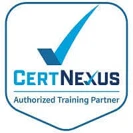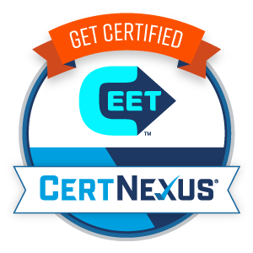Certified Ethical Emerging Technologist (CEET)
Book online today or, if you need help choosing the right course or would like to discuss business discounts, call us on 0113 220 7150.
Virtual
From £3,500 +VAT
Overview
The Certified Ethical Emerging Technologist (CEET) is designed for individuals seeking to demonstrate a vendor neutral, cross-industry, and multidisciplinary understanding of applied technology ethics that will enable them to navigate the processes by which ethical integrity may be upheld within emerging data-driven technology fields (such as artificial intelligence (AI)/machine learning, Internet of Things (IoT), data science and information security).
Technology professionals now face growing demands to identify and mitigate ethical risks to human rights and the environment, as well as to navigate ethical tradeoffs between qualities such as privacy and accuracy, fairness and utility, and safety and accountability. This course provides the tools to identify and manage common ethical risks in the development of emerging data-driven technologies. It distills ethical theory, public regulations, and industry best practices into concrete skills and guidelines needed for the responsible development of digital products and services. By following the course's practical, problems-based approach, learners will become adept at applying theories, principles, frameworks, and techniques in their own roles and organisations.
At the end of this course, you’ll sit the CET-110 exam, which is included in the course and get your CertNexus Certified Ethical Emerging Technologist (CEET) certification. As a CertNexus Authorised Training Partner, you’ll learn from certified instructors, and get access to official courseware and exams.
Prerequisites
There are no formal prerequisites for this accelerated course. This course is designed for technology and security leaders, privacy practitioners, solution developers, project managers, product owners, organisational decision makers, and other individuals seeking to demonstrate a vendor-neutral, cross-industry understanding of ethics in emerging technology fields.
Delegates will learn how to
Delegates will learn how to;
- Describe general concepts, theories, and challenges related to ethics and emerging technologies.
- Identify ethical risks.
- Practice ethical reasoning.
- Identify and mitigate safety and security risks.
- Identify and mitigate privacy risks.
- Identify and mitigate fairness and bias risks.
- Identify and mitigate transparency and explainability risks.
- Identify and mitigate accountability risks.
- Build an ethical organization.
- Develop ethical systems in technology-focused organizations.
Outline
Module 1: Introduction to Ethics of Emerging Technologies
- What’s at Stake
- Ethics and Why It Matters
- Ethical Decision-Making in Practice
- Causes of Ethical Failures
Module 2: Identifying Ethical Risks
- Ethical Reasons
- Stumbling Blocks for Ethical Reasoning
- Identify Ethical Risks in Product Development
- Tools for Identifying Ethical Risks
- Use Regulations, Standards, and Human Rights to Identify Ethical Risks
Module 3: Ethical Reasoning in Practice
- Ethical Theories
- Use Ethical Decision-Making Frameworks
- Select Options for Action
- Avoid Problems in Ethical Decision-Making
Module 4: Identifying and Mitigating Security Risks
- What Is Security?
- Identify Security Risks
- Security Tradeoffs
- Mitigate Security Risks
Module 5: Identifying and Mitigating Privacy Risks
- What Is Privacy?
- Identify Privacy Risks
- Privacy Tradeoffs
- Mitigate Privacy Risks
Module 6: Identifying and Mitigating Fairness and Bias Risks
- What Are Fairness and Bias?
- Identify Bias Risks
- Fairness Tradeoffs
- Mitigate Bias Risks
Module 7: Identifying and Mitigating Transparency and Explainability Risks
- What Are Transparency and Explainability?
- Identify Transparency and Explainability Risks
- Transparency and Explainability Tradeoffs
- Mitigate Transparency and Explainability Risks
Module 8: Identifying and Mitigating Accountability Risks
- What Is Accountability?
- Identify Accountability Risks
- Accountability Tradeoffs
- Mitigate Accountability Risks
Module 9: Building an Ethical Organisation
- What Are Ethical Organisations?
- Organisational Purpose
- Ethics Awareness
- Develop Professional Ethics within Organisations
Module 10: Developing Ethical Systems in Technology-Focused Organisations
- Policy and Compliance
- Metrics and Monitoring
- Communication and Stakeholder Engagement
- Ethical Leadership
Exam Information
CertNexus Certified Ethical Emerging Technologist (CET-110) exam, which is included and taken online post course.
- Exam code: CET-110
- Language: English
- Duration: 2 hours
- Number of questions: 80
- Question format: Multiple-choice/multiple response
- Passing score: 62%
QA is proud to be an authorised CertNexus partner.


Cyber Security learning paths
Want to boost your career in cyber security? Click on the roles below to see QA's learning pathways, specially designed to give you the skills to succeed.
 = Required
= Required
 = Certification
= Certification



















AI Security & Governance learning paths
Want to boost your career in AI Security & Governance? View QA's learning pathway below, specially designed to give you the skills to succeed.
 = Required
= Required
 = Certification
= Certification
Frequently asked questions
See all of our FAQsHow can I create an account on myQA.com?
There are a number of ways to create an account. If you are a self-funder, simply select the "Create account" option on the login page.
If you have been booked onto a course by your company, you will receive a confirmation email. From this email, select "Sign into myQA" and you will be taken to the "Create account" page. Complete all of the details and select "Create account".
If you have the booking number you can also go here and select the "I have a booking number" option. Enter the booking reference and your surname. If the details match, you will be taken to the "Create account" page from where you can enter your details and confirm your account.
Find more answers to frequently asked questions in our FAQs: Bookings & Cancellations page.
How do QA’s virtual classroom courses work?
Our virtual classroom courses allow you to access award-winning classroom training, without leaving your home or office. Our learning professionals are specially trained on how to interact with remote attendees and our remote labs ensure all participants can take part in hands-on exercises wherever they are.
We use the WebEx video conferencing platform by Cisco. Before you book, check that you meet the WebEx system requirements and run a test meeting (more details in the link below) to ensure the software is compatible with your firewall settings. If it doesn’t work, try adjusting your settings or contact your IT department about permitting the website.
Learn more about our Virtual Classrooms.
How do QA’s online courses work?
QA online courses, also commonly known as distance learning courses or elearning courses, take the form of interactive software designed for individual learning, but you will also have access to full support from our subject-matter experts for the duration of your course. When you book a QA online learning course you will receive immediate access to it through our e-learning platform and you can start to learn straight away, from any compatible device. Access to the online learning platform is valid for one year from the booking date.
All courses are built around case studies and presented in an engaging format, which includes storytelling elements, video, audio and humour. Every case study is supported by sample documents and a collection of Knowledge Nuggets that provide more in-depth detail on the wider processes.
Learn more about QA’s online courses.
When will I receive my joining instructions?
Joining instructions for QA courses are sent two weeks prior to the course start date, or immediately if the booking is confirmed within this timeframe. For course bookings made via QA but delivered by a third-party supplier, joining instructions are sent to attendees prior to the training course, but timescales vary depending on each supplier’s terms. Read more FAQs.
When will I receive my certificate?
Certificates of Achievement are issued at the end the course, either as a hard copy or via email. Read more here.
